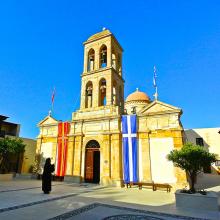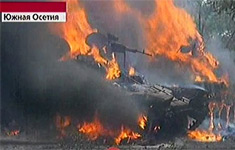Russian Orthodox Church
For years a vocal minority at Saint Nicholas’ parish in the middle-class Kyiv commuter town of Irpin resisted calls to split from their spiritual fathers in Moscow.
Since the Russian Supreme Court on April 20 declared the Jehovah’s Witnesses an extremist group, its members have faced increasing harassment from both authorities and suspicious neighbors.
And last week, for the first time since the decision, a Jehovah’s Witness has been not only detained by police, but jailed by a judge.
Since the Russian Supreme Court labeled Jehovah’s Witnesses an “extremist” group, vandals have targeted followers and their banks accounts have been frozen. Stones were thrown at a St. Petersburg assembly hall, and someone tried to burn the Moscow home of a Jehovah’s Witness to the ground, a church spokesman said.

Image via Tom Heneghan / RNS
The Russian Orthodox Church, whose boycott of a major summit of Orthodox Christian leaders in Crete last month threatened to slow down efforts to promote greater unity, has declared the meeting “an important event in the history of the conciliar process.”
The church’s synod, in its official reaction to the June 20-26 Holy and Great Council, also said the meeting could not be called “pan-Orthodox” because four of the 14 independent Orthodox member churches did not attend.
When we meet Kolya, the film’s protagonist, he’s in the midst of a long legal battle. He’s about to lose the house he built to the town’s mayor, a paranoid man obsessed with his own job security. Kolya’s already lost in court, but enlists the help of former army buddy Dimitri, a high-powered lawyer, to help him with an appeal. After the appeal’s failure, and some nasty bullying from local officials, Kolya is hit with a seemingly endless avalanche of humiliation and personal catastrophes.
The fishing village depicted in the film is a run-down hamlet characterized by an impressive amount of skeletal remains — and not just the kind that live in the closet. It’s strewn with ruined buildings, wrecked boats, and massive whale skeletons. In our world, the best architecture serves as a testament to man’s accomplishments, but the buildings and bones of Leviathan do exactly the opposite. They’re a constant reminder of decay and the temporary nature of what we mere mortals spend so much energy building and fighting over. Leviathan’s target is corruption in Russia, but its themes of pride, personal struggle, and frustration are universal.
Next week’s summit between Pope Francis and Russian President Vladmir Putin may be the most important meeting between a pontiff and a visiting head of state in nearly a quarter of a century, with war-torn Syria expected to be the top priority.
Francis has met with more than a dozen heads of state or government as pontiff, and Putin has met with both Pope Benedict XVI and Pope John Paul II. But this meeting stands out.
It’s been just four years since full diplomatic ties were re-established between Russia and the Holy See, set against a backdrop of centuries of tension between the Vatican and the Russian Orthodox Church.
Perhaps I’ve missed something about Russian law, but it seems to me that it’s a conveniently trumped up charge to keep the women sequestered until (hopefully for the Putin Administration, at least) the attention blows over and the perpetually-distracted news cycle moves on. In short, I can’t imagine, at least from my cultural context, that such a sentence could be justified as anything less than government bullying.
As for the location of their “Punk Prayer” at the altar of a Russian Orthodox church, this state church has been in the pocket of the government for quite a long time, it turns out. In reading up a little more, the choice of such a church for their protest seems less shocking and more concertedly poignant, given the church’s complicity in promoting the agenda of the Powers that Be. Rather than standing up in the face of authority as an advocate for the poor and oppressed (arguably one of the principal responsibilities of a church), they have joined in the subjugation of human rights in Russia.
Three women from the Russian feminist punk collective Pussy Riot were convicted today of "hooliganism motivated by religious hatred."
Nadezhda Tolokonnikova, 22, Marina Alyokhina, 24, and Yekaterina Samutsevich, 30, were arrested in February following an uninvited “punk prayer” of protest against the iron fist and faux democracy of Russian president Vladimir Putin and calling to account the theological rubber-stamping of Putin's repressive regime by the Russian Orthodox Church.
Their "performance prayer" titled "Hail Mary, Putin Run!" (see video and lyrics) was offered to the Virgin Mary at the altar of Christ the Savior Orthodox Cathedral in Red Square. After spending five months in jail since the event, they were sentenced today to two years — time served credited against the sentence, so they've got another 19 months to go. While some have directly attacked the band as anti-religious, others have attempted to more subtly undercut them by saying their actions are just publicity stunts to get money. I say, Wrong and wrong. Acts of ecclesial disobedience are called for when institutions that are supposed to represent God fail to do so. And spending two years in a Russian prison - as a woman - is not the kind of thing we do for money.
 The recent Georgia-Russia mini-war in and around South Ossetia was definitely not a religious war, but it serves as a reminder that religious identity doesn't even come in third place when issues of national identity are at issue. While the battle raged, the majority of participants -- and casualties -- were Christians on both sides.
The recent Georgia-Russia mini-war in and around South Ossetia was definitely not a religious war, but it serves as a reminder that religious identity doesn't even come in third place when issues of national identity are at issue. While the battle raged, the majority of participants -- and casualties -- were Christians on both sides.
In both countries, the Orthodox Church [...]





